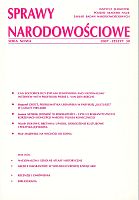National Identity – Plural? Shattered? Lost? Hungarians abroad and the failures of the centre-right in Hungarian elections
National Identity – Plural? Shattered? Lost? Hungarians abroad and the failures of the centre-right in Hungarian elections
Author(s): Eric Beckett WeaverSubject(s): Cultural Essay, Political Essay, Societal Essay
Published by: Instytut Slawistyki Polskiej Akademii Nauk
Keywords: Hungary; national identity; national minority; elections
Summary/Abstract: While national identity and nationalism have long been recognized as being comprised of numerous components, they are often assumed to be singular and unified phenomena, covering the whole of any given nation. Typologies of the varieties of nationalisms (eastern–western, civic, ethnic, etc.) are generally based upon such assumptions. Another assumption often made is that ethnic nationalisms are more exclusive than civic forms of national identity. Through the example of just one aspect, that of the place held by co-ethnics who are not citizens of the national state, Weaver demonstrates that the assumption made by some Hungarian politicians and social scientists of the homogeneity of national identity, and attempts to mobilize it, has repeatedly led to failure in elections. The differences Weaver demonstrate in perceptions of this single aspect of national identity in Hungary pose a challenge to assumptions made about the unified nature of nationalism, and have implications for other nations with large populations of co-ethnics living outside their state borders. Choć tożsamość narodowa i nacjonalizm są od dawna postrzegane jako złożone z wielu różnych komponentów, to jednak często zakłada się, że stanowią zjawiska jednolite i zunifikowane i odnoszą się do danego narodu jako całości. Typologie nacjonalizmów (wschodni–zachodni, obywatelski, etniczny itd.) na ogół opierają się na takich właśnie założeniach. Częste jest też inne założenie, według którego nacjonalizmy etniczne są bardziej wykluczające niż obywatelskie formy tożsamości narodowej. Na przykładzie tylko jednej kwestii, a mianowicie stanowiska zajmowanego przez rodaków, którzy nie są obywatelami państwa narodowego, autor przekonuje, że zakładana przez niektórych węgierskich polityków i badaczy społecznych jednorodność tożsamości narodowej, jak też próby jej mobilizowania niezmiennie prowadzą do porażki wyborczej. Ukazane przez autora różnice w postrzeganiu tego jednego aspektu tożsamości narodowej na Węgrzech podważają założenia mówiące o jednolitym charakterze nacjonalizmu. Mają też one implikacje dla innych państw z licznymi grupami ludności żyjącej poza granicami własnego państwa, stanowiącymi tam mniejszości narodowe.
Journal: Sprawy Narodowościowe
- Issue Year: 2007
- Issue No: 30
- Page Range: 45-54
- Page Count: 10
- Language: English

